2014仁爱英语八年级下册 语法复习及配套练习(原创)
- 格式:doc
- 大小:132.50 KB
- 文档页数:17
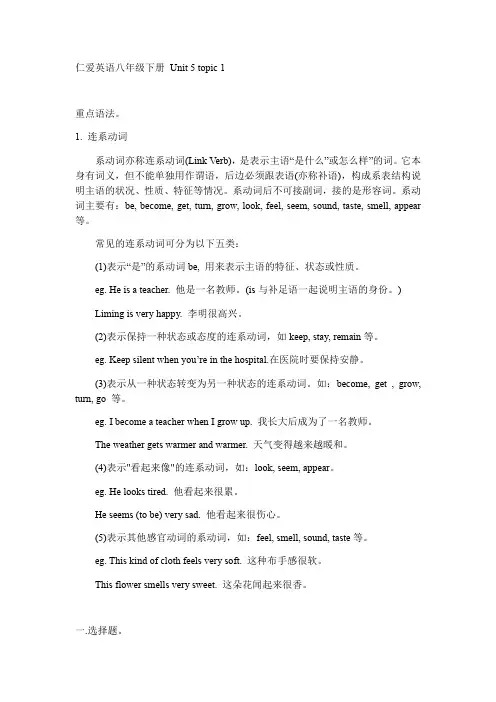
仁爱英语八年级下册Unit 5 topic 1重点语法。
1. 连系动词系动词亦称连系动词(Link Verb),是表示主语“是什么”或怎么样”的词。
它本身有词义,但不能单独用作谓语,后边必须跟表语(亦称补语),构成系表结构说明主语的状况、性质、特征等情况。
系动词后不可接副词,接的是形容词。
系动词主要有:be, become, get, turn, grow, look, feel, seem, sound, taste, smell, appear 等。
常见的连系动词可分为以下五类:(1)表示“是”的系动词be, 用来表示主语的特征、状态或性质。
eg. He is a teacher. 他是一名教师。
(is与补足语一起说明主语的身份。
)Liming is very happy. 李明很高兴。
(2)表示保持一种状态或态度的连系动词,如keep, stay, remain等。
eg. Keep silent when you’re in the hospital.在医院时要保持安静。
(3)表示从一种状态转变为另一种状态的连系动词。
如:become, get , grow, turn, go 等。
eg. I become a teacher when I grow up. 我长大后成为了一名教师。
The weather gets warmer and warmer. 天气变得越来越暖和。
(4)表示"看起来像"的连系动词,如:look, seem, appear。
eg. He looks tired. 他看起来很累。
He seems (to be) very sad. 他看起来很伤心。
(5)表示其他感官动词的系动词,如:feel, smell, sound, taste等。
eg. This kind of cloth feels very soft. 这种布手感很软。
This flower smells very sweet. 这朵花闻起来很香。
![[2014新版]仁爱英语八年级下册语法知识点、作文总复习资料讲解学习](https://uimg.taocdn.com/46f3574f8762caaedc33d440.webp)
Unit 5Feeling ExcitedTopic1: I’m so happy.1. How are you doing?=How are you? 你好吗?2 .invite sb. to do sth= ask sb. to do邀请某人做某事3. prepare for sth准备某事(准备时间较长/思想上的准备):prepare for the examsth for sb.为某人准备…:prepare food for Lilyto do sh准备做…:I prepare to go hiking.4.say sth to sb.对某人说….:say thanks/hello/goodbye to Jane5.系动词+adj.系表结构① be (am/is/are/was/were)②感官v.(feel, look, sound, taste品尝,smell闻、嗅)③四变化(turn/become/go/ get) *turn侧指颜色变化④ keep, stay, make6. One of + the + 形容词最高级+ 可数名词复数“……中最……之一”。
当其做主语,谓语动词用单数。
e.g. One of the bags is mine. e.g. It is one of the most interesting books.7. a ticket to/for…一张…的票 a ticket to/for the concert 一张音乐会的门票8. be+ adj. + 介词结构be proud of自豪,骄傲 e.g. The teacher is proud of his student.人+be pleased with+物对……感到满意 e.g. Jim is pleased with his new bike.物+be popular with+人受…的欢迎e.g. The book is popular with students.be worried about; be afraid of; be angry with;be interested in; be nervous about; be famous for+sth/as+身份be surprised at; be excited about/at sth; be strict with sb.setting the table for guests.9. set the table for sb.为某人摆餐具 e.g. I’m10. I hope everything goes well. 我希望一切顺利。
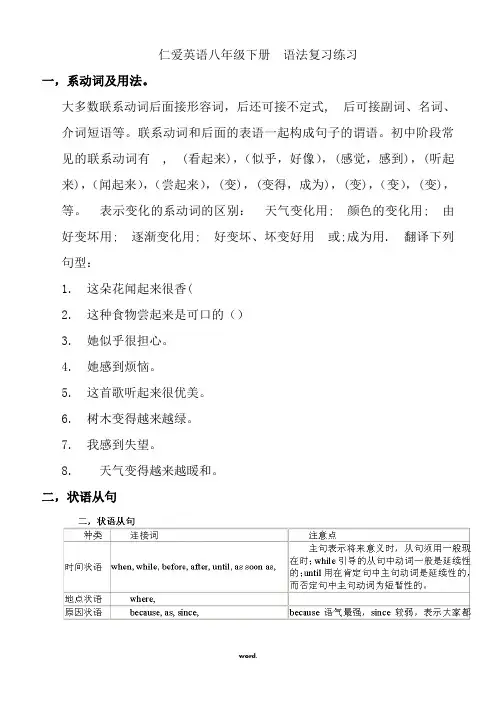
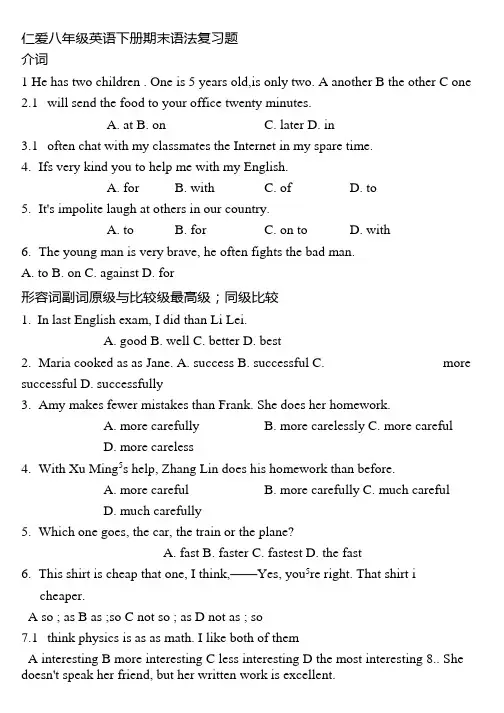
仁爱八年级英语下册期末语法复习题介词1 He has two children . One is 5 years old,is only two. A another B the other C one2.1will send the food to your office twenty minutes.A. atB. onC. laterD. in3.1often chat with my classmates the Internet in my spare time.4.Ifs very kind you to help me with my English.A. forB. withC. ofD. to5.It's impolite laugh at others in our country.A. toB. forC. on toD. with6.The young man is very brave, he often fights the bad man.A. toB. onC. againstD. for形容词副词原级与比较级最高级;同级比较1.In last English exam, I did than Li Lei.A. goodB. wellC. betterD. best2.Maria cooked as as Jane. A. success B. successful C. more successful D. successfully3.Amy makes fewer mistakes than Frank. She does her homework.A. more carefullyB. more carelesslyC. more carefulD. more careless4.With Xu Ming5s help, Zhang Lin does his homework than before.A. more carefulB. more carefullyC. much carefulD. much carefully5.Which one goes, the car, the train or the plane?A. fastB. fasterC. fastestD. the fast6.This shirt is cheap that one, I think,——Yes, you5re right. That shirt icheaper.A so ; asB as ;soC not so ; asD not as ; so7.1think physics is as as math. I like both of themA interestingB more interestingC less interestingD the most interesting 8.. She doesn't speak her friend, but her written work is excellent.A. as well asB. so often asC. so much asD. as good as 短语辨析(二种)+固定搭配 ()1. My uncle's family is very poor, so he work hard to make moremoney.A. need toB. needsC. needs toD. needed to2, —Do you think Brazil will beat Japan in the next match?—Yes. They have better players. And I them to win the matchnext Sunday.A. hopeB. preferC. wishD. think 3. When you have some difficult math problems, you can your math teacher. A. turn toB. to askC. turnD. ask for4 Jenny's teeth are not good, because she .A. has a sweet toothB. has sweet toothC. have a sweettoothD. have sweet teeth5. Please the ham and green onions finely, then add them to the bread. A. cut up B. cut into C. cut inD. cut off 6.1 remembered ___ off the light last night, but it was still on.A. turningB. to turnC.turnedD. turn 7. My little sister likes some soft drinks, _ _ tea, milk and lemonade. A. for example B. such as C. lookslikelike8. This book is very interesting, so it is worthA. readB. readingC. to readD. beread 9, —Why not go to the restaurant onfoot? t takes me ___ _ time. A. too little B. too much C. much tooD. many10.1 don't knowor not the film is suitable for children.A. ifB. whetherC. weatherD. which11. Yesterday I rode to school instead ___ A. taking B. of taking a taxi. C. tookD. of took12. Boys and girls, help to some apples!A. youB. yoursC. yourselfD. yourselves13. Not only you but also I interested in the English song Yesterday OnceMore. A. am B. are C. was D. were14, —Will you please __ s o much noise, Dongdong? —Sorry. Iwon't.A. makeB. not makeC. to makeD. not to make15.1don't know or not he is right. A. that B. what C. if D. whether16.—Remember off the lights when you leave the room, —OK. I will.A. to turnB. turingC. takingD. to take17.The menu has so many good things! I can't decide .A. what to eatB. how to eatC. where to eatD. when to eat18.—that the 31st Olympic Games will be held in New York, — exciting news!A. It said; WhatB. It is said; WhatC. It said; HowD. It is said; How19.Lily Milly like pizza. They often say pizza is very delicious.A. Either; orB. Neither; norC. Not only; but alsoD. Both; and20.1did in last English exam and I hardly made mistakes.A. enough goodB. good enoughC. enough wellD. well enough21. Remember not to have drink. A. too many B. too much C.many too D. much too连词辨析(as soon as / not unitl/ while/when)+时间状语从句When before; as soon as until while after1.He lived in a small town he came to Beijing.2.Te boys were very glad they won the soccer game.3.He told me the god news he saw me.4.Don't get off the bus it stops.5.Please give me a ring you talk to your father.6.Dad was washing his car, Mom was cooking.7 I won't believe you I have seen it with my own eyes. A. before B. until C. afteD. when8 He home she was satisfied (¥苗意)with his answer yesterday.A. didn't go; until;B. wasn't go; after;C. doesn't go; before;9,—Do you know when the train ? —At about 7:00 p.m. We'll meet Miss Li here soon.A.leavesB.reachesC.gets toD.arrives10.ril tell you as soon as I the news.A.will getB.getC.gotD.am getting11.Can you finish the work before he tomorrow . ----- No problem.A.will get heree backC.leaves for ShanghaiD.will arrive四个花费花时间1他花了一年的时间学习如何开车。
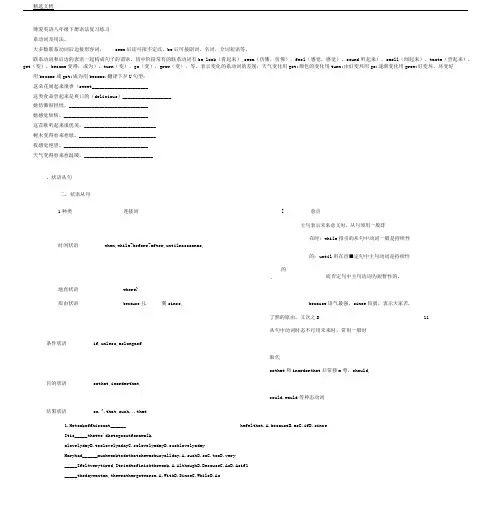
博爱英语八年级下册语法复习练习系动词及用法。
大多数联系动词后边接形容词,seem后还可接不定式,be后可接副词、名词、介词短语等。
联系动词和后边的表语一起构成句子的谓语。
初中阶段常有的联系动词有be,look(看起来),seem(仿佛,仿佛),feel(感觉,感觉),sound听起来),smell(闻起来),taste(尝起来),get(变),become变得,成为),turn(变),go(变),grow(变),等。
表示变化的系动词的差别:天气变化用get;颜色的变化用turn;由好变坏用go;逐渐变化用grow;好变坏、坏变好用become或get;成为用become.翻译下歹U句型:这朵花闻起来很香(sweet______________________这类食品尝起来是爽口的(delicious)___________________她仿佛很担忧。
_______________________________她感觉烦恼。
_________________________________这首歌听起来很优美。
____________________________树木变得愈来愈绿。
______________________________我感觉绝望。
_________________________________天气变得愈来愈温暖。
___________________________,状语从句二,状语从句1种类连接词[意点主句表示未来意义时,从句须用一般琲时间状语when,while?before?after,untilrassoonas,在时:while指引的从句中动词一般是持续性的;until用在肯■定句中主句动词是持续性的,而否定句中主句动词为短暂性的。
地直状语where}原由状语because丑.翼since,because语气最强,since较弱,表示大家若.了然的原由,又次之D11条件状语从句中动词时态不行用未来时,常用一般时if,unless,aslongasf取代目的状语sothat和inorderthat后常接m萼,should, sothat,inorderthat,could.would等神态动词结果状语so.^.that,such...that1.Hetookoffhiscoat______ hefelthot.A.becauseB.asC.ifD.sinceItis_____thatwe'dketogooutforawalk.alovelydayB.toolovelyadayC.solovelyadayD.suchlovelyadayMaryhad______muchworktodothatshewasbusyallday.A.suchB.soC.tooD.very_____wellyoucandrive,youmustdrivecarefully.SolongasB.InorderthatC.NomatterhowD.ThemomentWritetomeassoonasyou_______toBeijing.A.willgetB.getC.gettingD.got布鲁斯太太对学生特别平和,以致于学生都很喜爱她。
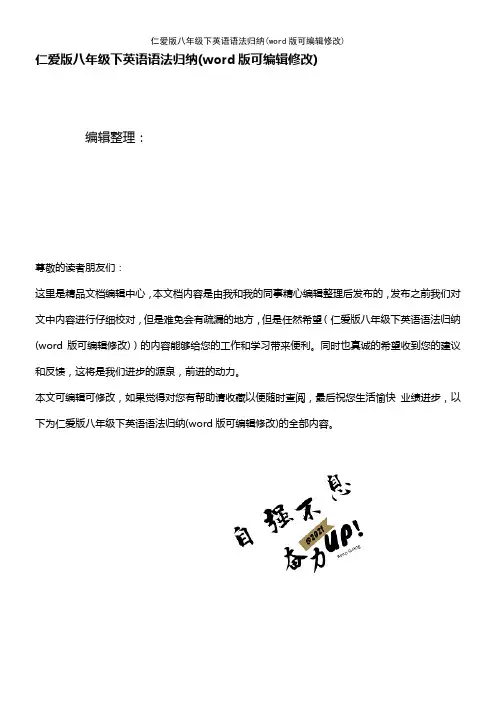
仁爱版八年级下英语语法归纳(word版可编辑修改)编辑整理:尊敬的读者朋友们:这里是精品文档编辑中心,本文档内容是由我和我的同事精心编辑整理后发布的,发布之前我们对文中内容进行仔细校对,但是难免会有疏漏的地方,但是任然希望(仁爱版八年级下英语语法归纳(word版可编辑修改))的内容能够给您的工作和学习带来便利。
同时也真诚的希望收到您的建议和反馈,这将是我们进步的源泉,前进的动力。
本文可编辑可修改,如果觉得对您有帮助请收藏以便随时查阅,最后祝您生活愉快业绩进步,以下为仁爱版八年级下英语语法归纳(word版可编辑修改)的全部内容。
八年级语法归纳Unit 5 Topic 1Section AInvite sb. /to do sth。
邀请某人做某事.Invite sb. \+地点邀请某人去某地。
Prepare…for…=get ready for…为……准备。
Say thanks to sb. 向某人道谢。
Section BA ticket to\for………的票.Be able to do sth…有能力做某事。
=can。
但是can 一般用于现在时和过去时而be able to可以用于任何时态。
Ring sb。
up 打电话给某人。
Be proud of 以……骄傲。
Be pleased with…对……满意。
Section CCare about 关心Care+从句省略aboutGet married to sb。
= marry sb。
与某人结婚.关于花费:Sth. Cost sb。
+钱Sb。
spend+时\钱 in、on sth.\doing sth.It take sb\时 to do sth.Sb.pay 钱 for sth.Be on 上映.Cheer up 使……振作。
What…for=why。
(口语)Section DCome into being 形成。
Be full of=be filled with充满。
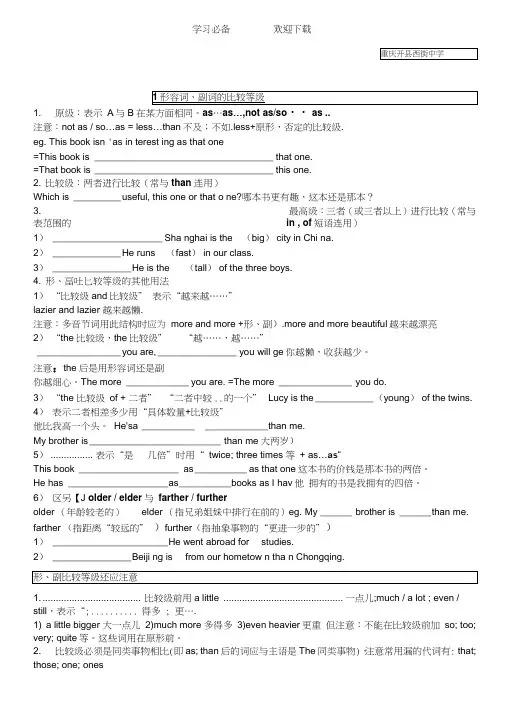
1. 原级:表示A与B在某方面相同。
as…as…,not as/so・・ as ..注意:not as / so…as = less…than不及;不如.less+原形,否定的比较级.eg. This book isn 'as in terest ing as that one=This book is __________________________________ that one.=That book is __________________________________ this one.2. 比较级:两者进行比较(常与than连用)Which is _________ useful, this one or that o ne?哪本书更有趣,这本还是那本?3. 最高级:三者(或三者以上)进行比较(常与表范围的in , of短语连用)1)_____________________ Sha nghai is the (big) city in Chi na.2)_____________ He runs (fast) in our class.3)_______________ H e is the (tall) of the three boys.4. 形、畐吐匕较等级的其他用法1)“比较级and比较级” 表示“越来越……”lazier and lazier 越来越懒.注意:多音节词用此结构时应为more and more +形、副).more and more beautiful越来越漂亮2)“the比较级,the比较级”“越……,越……”________________ you are, _______________ you will ge你越懒,收获越少。
注意:the后是用形容词还是副你越细心。
The more ____________ you are. =The more ______________ you do.3)“the 比较级of + 二者”“二者中较.. 的一个”Lucy is the ___________ (young) of the twins. 4)表示二者相差多少用“具体数量+比较级”他比我高一个头。
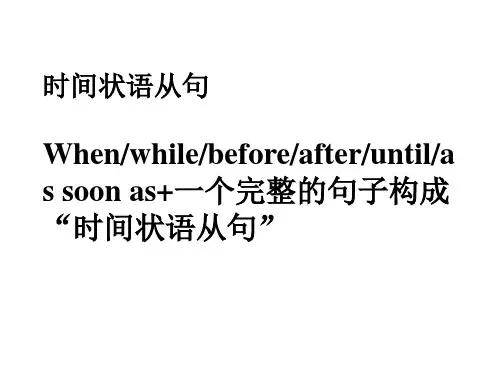
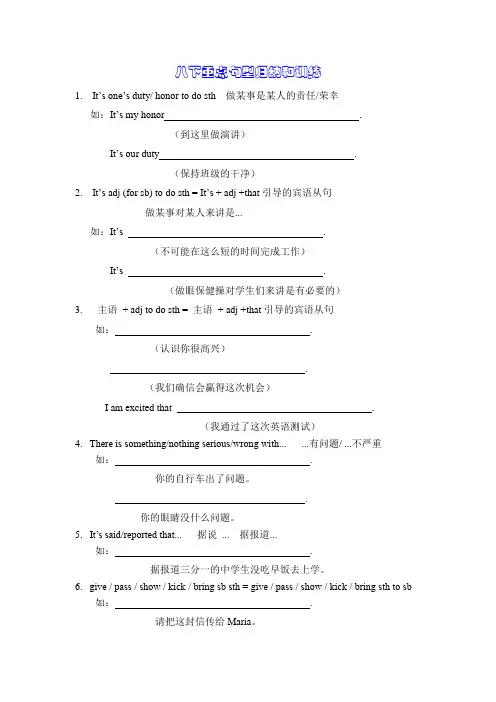
八下重点句型归纳和训练1. It’s one’s duty/ honor to do sth 做某事是某人的责任/荣幸(到这里做演讲)(保持班级的干净)2. It’s adj (for sb) to do sth = It’s + adj +that引导的宾语从句做某事对某人来讲是...(不可能在这么短的时间完成工作)(做眼保健操对学生们来讲是有必要的)3. 主语+ adj to do sth = 主语+ adj +that引导的宾语从句(认识你很高兴)(我们确信会赢得这次机会)(我通过了这次英语测试)4.There is something/nothing serious/wrong with... ...有问题/ ...不严重如:.你的自行车出了问题。
你的眼睛没什么问题。
5.It’s said/reported that... 据说... 据报道...如:.据报道三分一的中学生没吃早饭去上学。
6.give / pass / show / kick / bring sb sth = give / pass / show / kick / bring sth to sb如:.请把这封信传给Maria。
请把这封信传给Maria。
?你能把照片展示给我们看吗??你能把照片展示给我们看吗?7.see / hear / notice sb doing sth “看到/听到/注意到某人正在做某事”see / hear / notice sb do sth “经常看到/听到/注意到某人做某事”如:.刚才当我在公园散步时,我看见一些孩子在那里跳舞.。
我经常看见那女孩在我房子前面晨练。
8.“花费”句型:主语(人)+spend… (in) doing 花费(时间)做某事主语(人)+spend…on sth 花费(钱)在某物上It take sb +时间to do sth 做某事花某人...时间主语(物)+cost sb +钱某物花了某人...钱It cost sb +钱to do sth 做某事花某人...金钱pay..for... 为...花了...钱如:.刚才我花了十分钟打扫教室。
![[原创归纳]仁爱版八年级下英语语法归纳.doc](https://uimg.taocdn.com/73a04c57e009581b6ad9eba0.webp)
原创 , 归纳 , 仁爱 , 版 , 八年级 , 下 , 英语 , 语法 , 初 , 初二年下册英语语法归纳(仁爱版)Unit 5 Topic 1Section A1、系动词 +adj. 构成系表结构。
2、 Invite sb. / to do sth. 邀请某人做某事;Invite sb.\+地点邀请某人去某地。
3、Prepare for =get ready for 为准备。
4、 Say thanks to sb. 向某人道谢。
Section B1、for的票。
2、Be able to do sth =can 有能力做某事。
但是 can 一般用于现在时和过去时而 be able to 可以用于任何时态。
3、 Ring sb. up 打电话给某人。
4、 Be proud of 以骄傲。
5、Be pleased with对满意。
Section C1、 Care about关心;Care+从句省略about2、 Get married to sb.= marry sb.与某人结婚。
3、关于花费:Sth. Cost sb.+钱;Sb. spend+时钱in、on sth.\doing sth.时 to do sth. ;钱 for sth.4、 Be on 上映。
5、 Cheer up使振作。
6、What for=why 。
(口语)Section D1、 Come into being 形成。
2、 Be full of=be filled with 充满。
3、 End with 以结尾。
4、 Make peace with sb. 与某人讲和。
Unit 5 Topic 2To+动词不定式。
Section A1、 Seem / to do sth. 似乎做某事。
\ adj 作表语。
;It seem that+ 从句。
2、 Have talk with sb. 与某人交谈。
3、 Be strict with sb. 对某人严格。
2014 仁爱英语八年级下册语法复习及配套练习一,系动词及用法。
大多数联系动词后面接形容词,seem后还可接不定式, be后可接副词、名词、介词短语等。
联系动词和后面的表语一起构成句子的谓语。
初中阶段常见的联系动词有be , look(看起来),seem(似乎,好像),feel(感觉,感到),sound(听起来),smell(闻起来),taste(尝起来),get(变),become(变得,成为),turn(变),go(变),grow(变),等。
表示变化的系动词的区别:天气变化用get; 颜色的变化用turn; 由好变坏用go; 逐渐变化用grow; 好变坏、坏变好用become 或get;成为用become.翻译下列句型:1, 面包变酸了(sour).________________________1.这朵花闻起来很香(sweet________________________2.这种食物尝起来是咸的(salty)___________________3.那个妇女疯了。
____________________________4.她似乎很担心。
____________________________5.她感到烦恼。
______________________________6.这首歌听起来很动听。
_________________________7.树木变得越来越绿。
____________________________8.他变得越来越老。
______________________________9.天气变得越来越暖和。
_________________________10.似乎要下雨。
____________________________11.保持健康。
_____________________________12.最后,她成为了一名女警察。
____________________13.我感到失望。
________________________________时间状语从句,其连接词有:after,before,when,as,as soon as,until (till),while,since,by1 until (till) 直到,在用until 表达时间状语的句子中,主句中的动词是要十分小心去选择。
如动词是持续性动词,它要用肯定句,如:I studied hard ________ 12 o'clock last night.如果动词是瞬间截止性动词,则要用否定句,如:He ______ go to bed_______ until his mother came back.2 在状语从句中用一般现在时或一般过去时表示将来。
它们可能是主句用一般将来时,从句用一般现在时,如:If it rains, they won't go to the park on Sunday.as 强调随着时间推移,当…时。
考试中常见的考点有:要学生区别是条件、时间状语从句还是宾语从句,因在宾语从句中该用什么时态用什么时态,如:I want to know if he will come here tomorrow.if it rains, he will not come.原因状语从句中主要是①because,因为.表达的因果关系最强,如:He didn't pass the exam because he didn't studyhard②since 应译为"既然",如:Since you were ill yesterday, I left some notes on your desk.③as 应译为"由于",如:As it is too hot we'd better go swimming.since 与as 所表达的因果关系远比because 弱得多。
而for 表达的因果关系最弱。
它不能用于句首,如:He studies hard, for he wants to go to college.比较状语从句中有同级比较as …as,要注意的有两点:①as …as 中间要用原级而不是比较级。
②用形容词还是副词,如:Mary writes as carefully as Tom.Mary is as careful as Tom.状语从句练习1. _______ he’s old, he can still carry this heavy bag.A. ThoughB. SinceC. ForD. So2. ---Do you know if he _______ to play basket ball with us?---I think he will come if he ______ free tomorrow.A. comes; isB. comes; will beC. will come; isD. will come; will be3. In the zo o if a child _____ into the water and can’t swim, the dolphins may come up ______him.A. will fall; to helpB. falls; to helpC. will fall; helpD. falls; helping4. I don’t remember ________ he worked in that city when he was young.A. whatB. whichC. whereD. who5. We will stay at home if my aunt ________ to visit us tomorrow.A. comesB. comeC. will comeD. is coming6. The police asked the children _______ cross the street ________ the traffic lights turnedgreen.A. not; befor eB. don’t; whenC. not to; untilD. not; after7. I was late for class yesterday _______ there was something wrong with my bike.A. whenB. thatC. untilD. because8. I’ll go swimming with you if I ________ free tomorrow.A. will beB. shall beC. amD. was9. In the exam, the ________ you are, ______ the _______ mistakes you will make.A. careful; littleB. more careful; fewestC. more careful; fewerD. more careful; less10. You should finish your lessons _______ you go out to paly.A. beforeB. afterC. whenD. while11. I hurried _____ I wouldn’t be late for class.A. sinceB. so thatC. as ifD. unless12. When you read the book, you’d better make a mark _______ you have any questions.A. whichB. thatC. whereD. though13. The teacher raised his voice _______ all the students could hear him.A. forB. so thatC. becauseD. in order14. He took off his coat _______ he felt hot.A. becauseB. asC. ifD. since15. It is ______ that we’d like to go out for a walk.A. a lovely dayB. too lovely a dayC. so lovely a dayD. such lovely a day16. Mary had ______ much work to do that she stayed at her office all day.A. suchB. soC. tooD. very17. _______ I felt very tired, I tried to finish the work.A. AlthoughB. BecauseC. AsD. As if18. ______ the day went on, the weather got worse.A. WithB. SinceC. WhileD. As19. ______ well you can drive, you must drive carefully.A. So long asB. In order thatC. No matter howD. The moment20. Write to me as soon as you ________ to Beijing.A. will getB. getC. gettingD. got二. 根据中文意思完成下列英语句子1. 布鲁斯太太对学生非常亲切,以至于学生都很喜欢她。
Mrs Bruce was _______ kind to her students ______ they all______ her very much .2. 只要我们竭尽全力,父母就会满意我们的表现。
Our parents will be pleased with our performance _____ _____ ______ we try our best. 3. 你一到上海就给我打个电话好吗?Will you please call me ______ ______ ______ you get to Shanghai.4. 虽然她很忙,她还坚持自学英语。